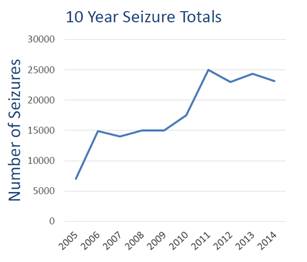Customs & Border Protection
Most people know that our U.S. Customs and Border Protection agency (CBP) has the ability to seize counterfeit and infringing goods at U.S. borders. But did you know that trademark and copyright registration owners can record those documents with CBP, and CBP will actively look for, seize and destroy infringing and counterfeit products?
CBP has substantial power to search imports and exports and exclude, detain and/or seize and destroy counterfeit and infringing products. And, if you help them by using their registration system, they’ll help you by seeking out problem imports and exports. When CBP suspects that goods are infringing, the goods are detained for up to thirty days — during which time CBP will determine whether to formally “seize” the goods. During the detention period, copyright and trademark owners are advised of the country of origin, the date of importation and the port of entry, and they are given a description of the merchandise and the quantity of merchandise being detained. If a seizure occurs, the copyright/trademark owner is advised of the country of origin, the date of importation, the port of entry, a description of the merchandise and the quantity of merchandise, and is also given the names and addresses of the manufacturer, exporter and importer. This information often proves invaluable if a lawsuit is warranted.

Graph of Annual Number of Counterfeit Seizures Source: Department of Homeland Security
Using the Intellectual Property Rights Recordation (IPRR) system is easy. It can be done online using a credit card, and the cost is minimal. If you are experiencing problems with counterfeit or infringing products being imported or exported at our borders, let us help you register your intellectual property rights with CBP. Making trademark and copyright rights known to border personnel works. In 2014 alone, more than $1.23 billion worth of illegal goods were seized by CBP.
Harness IP assists clients by familiarizing CBP with client products and by providing information about known or suspected infringers/infringing products. Using a system known as “C-TPATS” (Customs-Trade Partnership Against Terrorism Security), owners can assist CBP in recognizing counterfeits/knock-offs of their original products through a portal located online. CBP, at no cost, will engage with you and become familiar with your products so CBP agents can more readily identify illegal products at the border. Just let us know if you’d like more information about this useful, no-cost tool.
Return to Trademarks and Service Marks
Return to Copyrights
Return to International